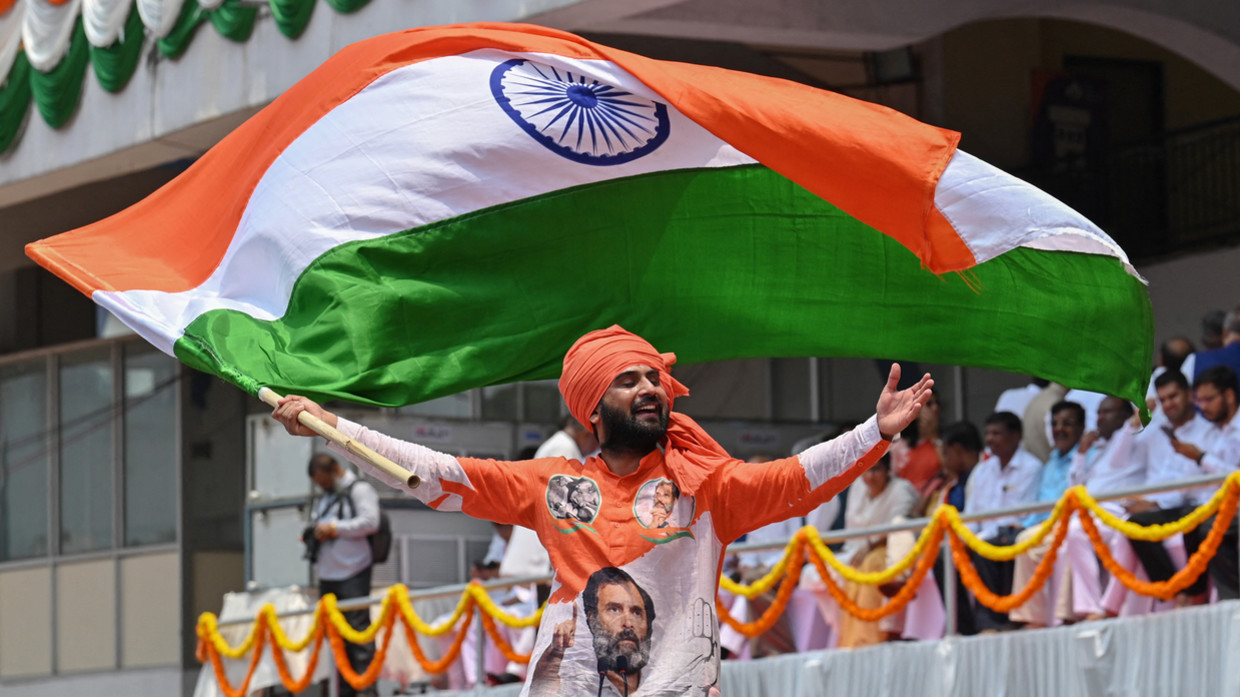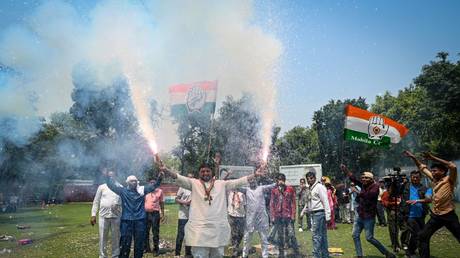The battlelines have been drawn as next year’s parliamentary elections draw closer in India, where incumbent Prime Minister Narendra Modi, 72, is seeking a third consecutive term. The Bharatiya Janata Party (BJP)-led National Democratic Alliance (NDA) and opposition parties are both holding key meetings to form stronger political forces ahead of the crucial vote.
How do the numbers match up?
The NDA, which was formed 1998, will hold a meeting at the Ashok Hotel in New Delhi on Tuesday, where it claims 38 parties, including several small regional outfits, will back the alliance. The opposition, which was named the United Progressive Alliance (UPA) after the 2004 parliamentary elections under its chairperson and Congress Party president Sonia Gandhi, started a two-day meeting in Bengaluru, Karnataka, on Monday.
The fractured opposition – a motley crew of 26 parties – is seeking to iron out its differences and project a united front in the monsoon session of parliament, which starts on Thursday amid the buzz of a possible cabinet reshuffle of the Modi government. The opposition grouping is likely to change its name from the UPA, which is seen as a relic from the Congress era as the grand old party’s electoral fortunes have dwindled in the last two parliamentary elections. Congress general secretary K.C. Venugopal has refused to elaborate on the new name, which will be decided on Tuesday after the parties arrive at a consensus.
What is the opposition planning?
The Congress, which is in power in four states, namely Karnataka, Chhattisgarh, Himachal Pradesh and Rajasthan, has steadily lost its pan-Indian appeal, despite ruling the country for close to 60 years after India gained Independence from the British in 1947. The party is open to compromises to stitch together an anti-BJP alliance.
On Sunday, after weeks of procrastination, it came out in support of the Aam Aadmi Party’s (AAP) campaign against the contentious Modi government’s order that wrests back control of Delhi’s bureaucracy. (There was a stand-off between the Arvind Kejriwal-led AAP administration in Delhi and the Modi government, as the national capital is yet to enjoy the full-fledged status of a state). The Congress’ support for the AAP came following a deal brokered by West Bengal chief minister and Trinamool Congress (TMC) chief Mamata Banerjee.
The agenda for the opposition meeting was set by Congress’ senior leaders, including Venugopal, MP Dr. Jairam Ramesh, Deputy Chief Minister of Karnataka D.K. Shivakumar, and Pawan Khera. The meeting aims at outlining the electoral strategy to defeat the BJP along with a common minimum agenda. A consolidated floor strategy for the monsoon session of parliament will be discussed and is likely to be the first test to showcase unity in the opposition ranks.
Opposition unity gathered momentum at an event in Patna on June 23, which was organized by Bihar CM Nitish Kumar, a former NDA ally, and where 17 parties took part. According to Dr. Ramesh, the increase in the number of parties attending the Bengaluru meeting indicates that there is no space in Indian politics to “remain neutral” as the battlelines are clearly drawn.
The unity stems from a common agenda “to defend constitutional rights and independence of institutions that are under unprecedented attack under the Narendra Modi regime,” and to stand up against the BJP-led government’s supposed effort to unleash federal agencies to muzzle opposition voices. Congress leader Rahul Gandhi’s disqualification as an MP and his conviction in a 2019 criminal defamation case when he made a remark over the ‘Modi’ surname is cited by opposition parties as the “biggest example of misuse of government machinery.”
The anti-BJP bloc is likely to hold talks on seat-sharing on a state-to-state basis, which could prove to be a thorn in the side of opposition unity, as similar efforts to forge a consensus in the past came unstuck. Separate panels may be formed to chalk out the joint campaigning program of opposition parties such as holding rallies, conventions and agitations. The opposition is likely to raise the issue of tampering with Electronic Voting Machines and to suggest reforms of the Election Commission during the meeting, and the key outcomes are expected to be announced on Tuesday afternoon.
How will the BJP respond?
BJP president JP Nadda and Modi will preside over the NDA meeting on Tuesday. The BJP has invited several new allies and some former partners, even though not all of them have representation in parliament. Four leaders from Bihar – Chirag Paswan of the Lok Janshakti Party (Ram Vilas), Jitan Ram Manjhi of Hindustani Awam Morcha, Upendra Singh Kushwaha of the Rashtriya Lok Samta Party, and Mukesh Sahani of the Vikassheel Insaan Party – have been invited for the meeting, and are expected to join the NDA on Tuesday.
The Telugu Desam Party (TDP), led by N. Chandrababu and the Shiromani Akali Dal (SAD), a former NDA ally in Punjab, will not be part of the alliance. In Punjab, the BJP is considering the option of fighting next year’s elections on its own and is likely to ally with Telugu actor Pawan Kalyan’s JanaSena Party in Andhra Pradesh, instead of tying up with the TDP.
On Sunday, BJP chief Nadda alleged that opposition parties were forming an alliance to “protect” their dynastic politics. He gave a new moniker for the UPA in Hindi, which loosely translates as “oppression, favoritism, and atrocities,” and dubbed the opposition grouping as a “Protection of Dynasties Alliance” when referring to Congress-ruled Rajasthan, where elections are likely to be held at the end of this year. “All these people have joined the alliance to protect their families, while Modi works to take the country forward. We should understand the difference,” the BJP chief said. He called the Congress a party of “mother-son-daughter,” alluding to Sonia and Rahul Gandhi and Priyanka Gandhi-Vadra, alleging that other Congress leaders, including Rajasthan Chief Minister Ashok Gehlot, were on “contract.”


